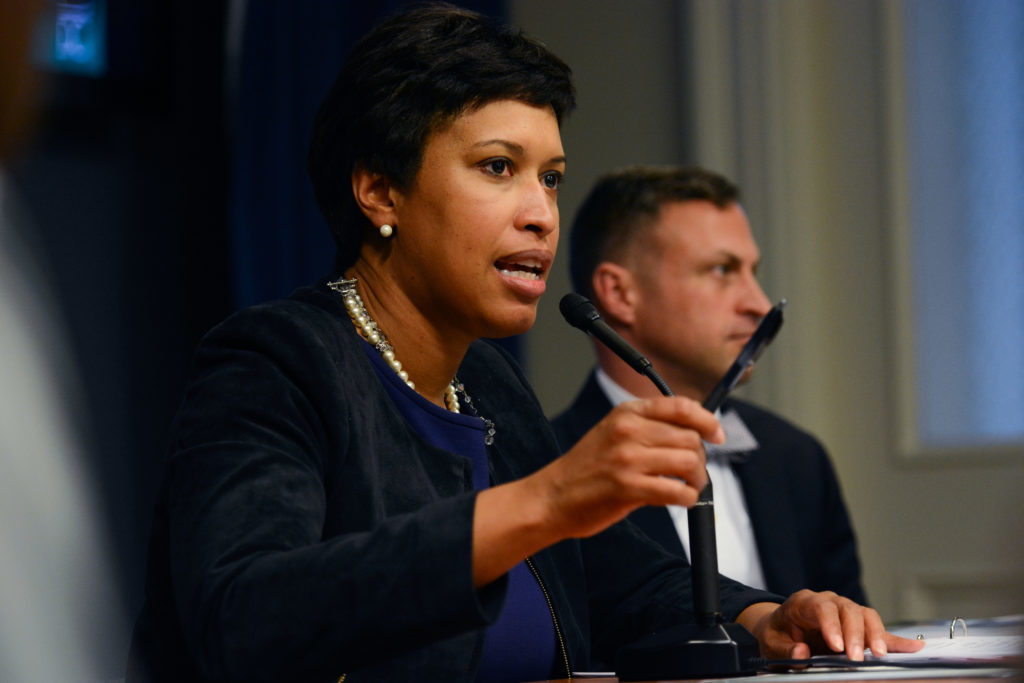D.C. officials want to pump millions more dollars into recruiting and retaining city police officers next year as they prepare for a staff shortage in an aging force.
Mayor Muriel Bowser’s proposed budget for next fiscal year dedicates $11.7 million to seven staffing programs in the Metropolitan Police Department. Bowser said the projects, all designed to attract new officers or free up police from administrative responsibilities to focus on law enforcement duties, would prevent an officer shortage as many current officers approach retirement age.
Still, the increase in funds designed to bring in more officers may not help the department become fully staffed – critics of the budget and mayoral administrators say MPD will only have enough funding to hire about 50 more officers, falling short of the 4,000 city officials say the force needs to be at its full capacity.
The proposed budget would nearly triple the funding for these programs compared to last year’s budget, which included $4.4 million devoted to recruiting officers and civilians. MPD’s budget would fall by $14 million overall – mainly because an outside fund would bankroll some of the department’s existing programs, City Administrator Rashad Young said at a public hearing earlier this month.
The programs provide incentives for younger officers to join and stay with MPD, rather than leave for other departments, Bower said at a roundtable discussion with student journalists last week.
The $13.8 billion budget funnels $1.2 million into a program providing six months of housing for new recruits and another $1.8 million to double the number of student police cadets, who receive tuition in exchange for a part-time job and future career within the department.
“We want to make sure that the officers who aren’t eligible to retire are seeing D.C. as their first choice to continue to work,” she said.
Over the next few years, officers who joined MPD during a hiring spree of about 1,000 staffers between 1989 and 1990 will soon reach 25 years of experience in the department and become eligible to retire, Bowser said. She said with many of those officers now leaving the force, recruitment and retention efforts need to be a major focus.
“We’ve known for a number of years that these years would be where we had a bubble where we actually had more people eligible to retire than we could hire which means we could possibly see some of our numbers go down,” she said.
The D.C. Council will vote on the budget in late May or June. Ward 7 Council member and former Mayor Vincent Gray said at a Council hearing that he was concerned the proposed budget would only support a force of 3,788 officers – about 50 more than the 3,737 the department had as of October.
The more qualifications you have for the applicant, I think the more energy and resources you have to put in for recruiting efforts.
In recent years, MPD hasn’t been able to replace all the officers that have left the force. Between fiscal year 2011 and fiscal year 2015, MPD lost 1,293 officers and hired 1,179, according the latest annual report from the department.
Although D.C. officials have prioritized recruiting more officers this year, the Council rejected a bill in February to add roughly 300 more officers to the force.
MPD spokeswoman Aquita Brown said in an email the department is optimistic about the increase in recruitment funding because the same projects have helped improve staffing over the past two years. So far this fiscal year, 56 more officers have joined the department and 14 percent fewer employees have left the department compared to last fiscal year.
“Mayor Bowser recognizes the need for investment in public safety, and it shows in this budget’s support of recruiting and retaining MPD officers,” she said.
Experts said that when recruiting officers, department leaders should consider the salaries and benefits they are offering to potential new officers and how their offers hold up to those made by other police departments.
Jeff Delinksi, the director for the police and security studies program in the College of Professional Studies, said when agencies offer incentives to recruits, they are more likely to choose to work there.
Delinksi said MPD has to put more resources into recruitment because it holds applicants to a higher standard than most other departments.
Most cops are looking for money in their wallet. Salary does make a difference.
MPD only accepts applicants for officer positions who have completed 60 college credits, served in the U.S. Armed Forces or worked three years as a full-time officer in a full-service police department, according to the department’s website.
“The more qualifications you have for the applicant, I think the more energy and resources you have to put in for recruiting efforts,” Delinski said.
David Dusenbury, the former deputy chief of police at the Long Beach Police Department in California, said that when departments hire civilians for minor tasks like parking enforcement and communications, they have more funding for officer pensions and salaries.
Dusenbury said the best way to retain officers is to offer higher salaries. Offering money for housing and tuition may not be as successful because officers may not want to live in the city and may leave the department after a tuition program expires if they find another job, he said.
“Most cops are looking for money in their wallet,” he said. “Salary does make a difference.”





